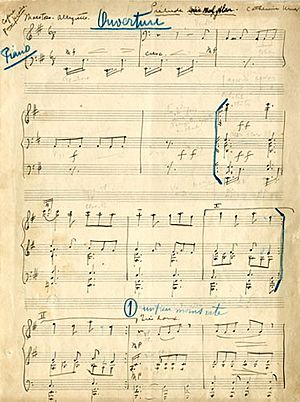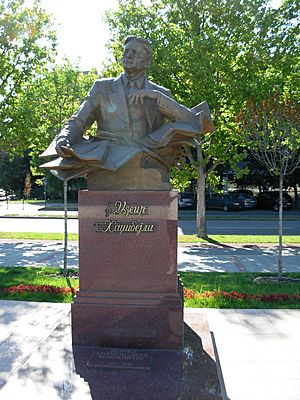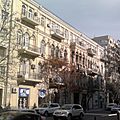Uzeyir Hajibeyov facts for kids
Quick facts for kids
Uzeyir Hajibeyov
|
|
|---|---|
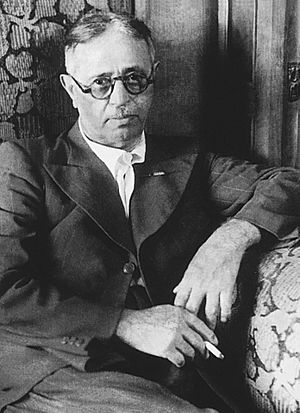
Hajibeyov in 1945
|
|
| Background information | |
| Birth name | Uzeyir Hajibeyli |
| Born | September 18, 1885 Agjabadi, Shusha uezd, Elizavetpol Governorate, Russian Empire |
| Died | November 23, 1948 (aged 63) Baku, Azerbaijani SSR, USSR |
| Genres | Classical |
| Occupation(s) | Composer, conductor, publicist, playwright, teacher, translator |
| Years active | 1904–1948 |
Uzeyir Hajibeyov (born September 18, 1885, died November 23, 1948) was a very important Azerbaijani composer. He was also a conductor, writer, and teacher. People often call him the "father" of Azerbaijani classical music and opera.
Hajibeyov wrote the music for the national anthem of Azerbaijan. This anthem was first used by the Azerbaijan Democratic Republic. It was brought back when Azerbaijan became independent again in 1991. He also wrote the anthem for Azerbaijan during the Soviet period. He was the first composer to create an opera in the Islamic world. His first opera, Leyli and Majnun, came out in 1908. People in Azerbaijan still honor him for bringing this famous story to life through music.
Contents
Early Life and Education
Uzeyir Hajibeyov was born in Aghjabadi, which is now part of Azerbaijan. His father worked for Khurshidbanu Natavan, a famous poet. His mother also grew up in Natavan's home. Growing up, Uzeyir was greatly inspired by Natavan's creative work.
Shusha, a city known for its music and culture in Azerbaijan, was very important to Hajibeyov. It was even called "the Music Conservatory of the Caucasus." This is because many talented musicians came from there. This musical background helped Hajibeyov write a full opera at just 22 years old, even with little formal music training.
Hajibeyov first went to a religious school, called a madrasah. There, he learned Arabic and Persian. Later, he studied at a Russian-Azerbaijani school. His favorite teacher, Mirza Mehdi Hasanzadeh, helped him learn about famous writers from both the East and West.
The rich music of Shusha deeply shaped Uzeyir's musical education. He once said that his first music lessons came from the best singers and instrument players. He would sing traditional Azerbaijani music called mughams. Singers liked his voice and taught him. His first teacher was his uncle, Agalar Aliverdibeyov, who knew a lot about Azeri folk music. When he was 13, Uzeyir sang in a choir for a play based on Leyli and Majnun.
From 1899 to 1904, Uzeyir Hajibeyov studied at the Gori Pedagogical Seminary. Here, he learned general subjects and music. He learned to play the violin, violoncello, and brass instruments. After graduating, he became a teacher in Hadrut.
After a year, Hajibeyov moved to Baku. He taught mathematics, geography, history, Azeri, Russian, and music. He also wrote a dictionary and a math textbook.
Hajibeyov lived through many big changes, like wars and revolutions. The way Azeri was written even changed three times. This made education and culture difficult. These challenges might have made him want to share his ideas through music and plays.
Combining Music Styles
Uzeyir Hajibeyov always tried to mix old traditions with new ideas. For example, when he was 15, he was told off for speaking his native language at school. But he kept his roots. Later, when some musicians wanted to ban traditional Azerbaijani instruments like the tar and kamancha, Hajibeyov fought to include them in Western orchestras. This helped these instruments survive and gain more respect.
Hajibeyov also opened music schools that blended different teaching styles. These schools helped train Azerbaijani musicians who could fit into the world music scene. He researched and taught the history and theory of Azerbaijani music. He truly combined Western and Eastern music traditions in Azerbaijan.
His Musical Works
In 1908, Hajibeyov wrote his first opera, Leyli and Majnun. It was based on a sad love story from the 15th century. This opera was special because it mixed traditional Azerbaijani mugham music with Western opera styles. It used instruments from both traditions. This was the first of seven operas and three musical comedies he would write.
His second opera, Sheikh Sanan, was written in 1909. This one was purely in a European style. It was praised for its music, but its message was too advanced for the time. Hajibeyov believed that marriage should not be limited by nationality or religion. The story was about a religious leader who falls in love with a Georgian woman. Her father raised pigs, which was forbidden for the leader's religion. The leader gives up his religion for her. People were offended and walked out of the show. Hajibeyov realized he had gone too far and burned the music score. He said, "I didn't destroy my opera. It's my own creation so it's always in my head." Years later, he used some of this music to create Koroğlu, which many consider his best work.
Other operas like Rustam and Sohrab (1910) and Asli and Karam (1912) were based on Azeri folk music.
In 2006, his musical comedy Arshin Mal Alan ("The Cloth Peddler"), written in 1913, was performed on Western stages for the first time.
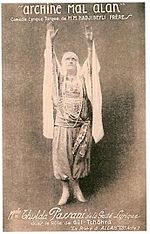
One of Hajibeyov's biggest achievements was starting a professional music school. The Baku Academy of Music was founded in 1920 and later named after him. This school has trained many great Azerbaijani composers. A statue of Hajibeyov sits in front of this building, which still teaches both Eastern and Western music.
In 1931, Hajibeyov helped create the Azeri Folk Instruments Orchestra. This orchestra played European classical music using traditional Azeri instruments. He was the first to adapt written music notes for these instruments.
In 1936, he helped start the Azerbaijani State Choir. He solved the problem of how to harmonize traditional Azeri folk songs, which usually have one main voice. He used special techniques to keep the songs' original style.
Hajibeyov also cared about women's rights. Many of his works show how he wanted women to have a more equal role in society. He often used comedy to make fun of old traditions, like how marriage partners were chosen when women still wore veils.
Famous Operas
“Leyli and Majnun”
Hajibeyov's opera "Leyli and Majnun" was the first opera in the entire Muslim East. It first showed on January 12, 1908. Hajibeyov wrote the story for the opera with his brother, Jeyhun Hajibeyov. It was based on a famous poem by Fuzuli.
The first show was directed by Huseyn Arablinski. Huseynqulu Sarabski played the main role of Majnun. Later, Hajibeyov himself often led the orchestra. Many famous singers have played the role of Majnun over the years.
“Koroglu”
The opera “Koroglu” first played on April 30, 1937. This was the first classical opera in Azerbaijan based on a heroic epic story. In this opera, Hajibeyov created beautiful songs, big choir scenes, and dance parts.
Musical Comedies
“Husband and Wife”
Hajibeyov's first musical comedy was “Husband and Wife.” It had three parts and was the first Azerbaijani musical comedy. It premiered in 1910. Hajibeyov wrote the story himself.
“If Not That One, Then This One”
After “Husband and Wife,” he wrote his second musical comedy. It first played in Baku in 1911. This opera includes a famous song called “Mən nə qədər qoca olsam da” and the folk music “Uzundere.” This comedy was translated into many languages and performed in different countries.
"Arshin Mal Alan"
The first movie based on the musical comedy “Arshin Mal Alan” was made in 1916. It was a silent film. Later, in 1945, a new version was filmed. Rashid Behbudov played the main role. In 1965, another film version was made in Baku. This comedy has been translated into many languages, including English, German, and Chinese.
Honors and Legacy
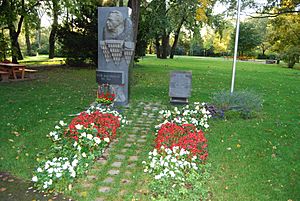
Uzeyir Hajibeyov was the first to create operas and operettas in the Eastern world. In 1938, he was given the high title of People's Artist of the USSR. He also received the Order of Lenin and won the Stalin Prize twice. He won for his opera Koroghlu in 1941 and for the film Arshin Mal Alan in 1946.
Hajibeyov was a professor and head of the Baku Academy of Music. He was also a member of the Academy of Sciences of Azerbaijan. For the last 10 years of his life, he led the Union of Azerbaijani Composers. He also served as a deputy in the Supreme Soviet of the Soviet Union, which was a top government body.
Uzeyir Hajibeyov passed away at 63 and was buried in the Alley of Honor in Baku.
On September 18, 1995, Azerbaijan celebrated his 110th birthday. Many people believe he did more than anyone else to build the foundation of Azerbaijani music today. He uniquely blended Eastern and Western musical styles and instruments.
In 2008, the National Bank of Azerbaijan made a special gold coin to remember Hajibeyov. In 2011, a monument to him was unveiled in Novi Sad, Serbia. In 2015, the Mayor of Los Angeles declared September 18 as "Uzeyir Hajibeyli Memorial Day." A U.S. Congressman also recognized his achievements.
Uzeyir Music Day
September 18 is celebrated as "Uzeyir Music Day" in Azerbaijan. This day was made official by a special order in 1995. Many events and celebrations with famous musicians happen on this day.
Stage Works
- Leyli and Majnun, opera, 1908.
- Sheikh Sanan, opera, 1909. (Destroyed by the composer.)
- Husband and Wife, operetta, 1910.
- O olmasın, bu olsun ("If Not That One, Then This One"). Musical comedy, 1910.
- Rustam and Zohrab, mugham opera, 1910.
- Asli and Kerem, mugham opera, 1912.
- Shah Abbas and Khurshid Banu, mugham opera, 1912.
- Arshin Mal Alan ("The Cloth Peddler"). Musical comedy, 1913.
- Harun and Leyli, mugham opera, 1915.
- Koroğlu ("The Blind Man's Son"), opera. Written 1936, premiered 1937.
- Chirpynirdi gara deniz (“The Black Sea raged”), song. Written 1918.
Images for kids
See also
 In Spanish: Uzeyir Hajibeyov para niños
In Spanish: Uzeyir Hajibeyov para niños
- List of People's Artists of the Azerbaijan SSR
 | Calvin Brent |
 | Walter T. Bailey |
 | Martha Cassell Thompson |
 | Alberta Jeannette Cassell |


